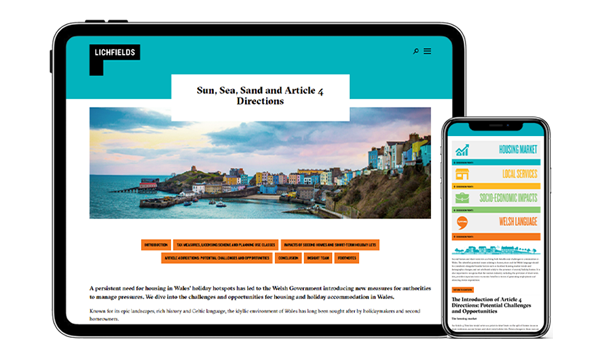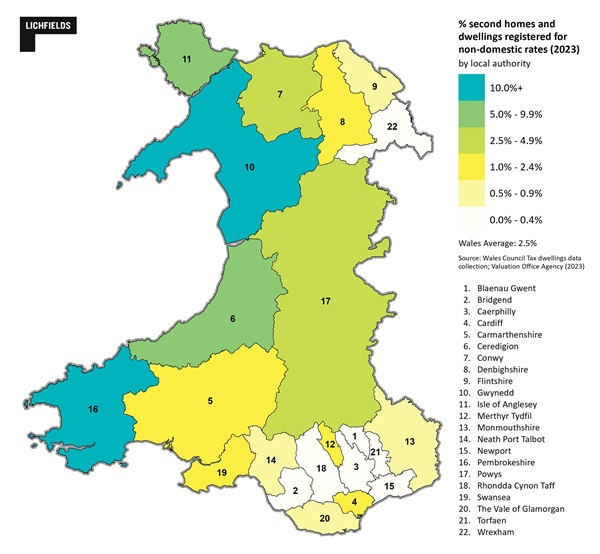
A new report calls for a more unified approach to planning policy in Wales to improve the long-term future for the country’s housing and holiday accommodation sectors.
The ‘Sun, Sea, Sand and Article 4 Directions’ Insight from planning specialist Lichfields recognises that tourism is a critical part of Wales’s economy, creating jobs for local people – particularly in the rural parts of the country – while attracting billions of pounds of expenditure annually from visitors and holidaymakers.
However, lifting the lid on the current situation, the report delves into the challenges and opportunities around the impact of second homes and short-term holiday lets, which account for 2.5% of all dwellings in Wales in 2023.

Given the country’s stunning scenery and rich history, combined with easy-to-use letting platforms, the country remains a popular holiday hotspot with places such as Gwynedd, Pembrokeshire and Anglesey particularly attractive destinations for second homes and short-term lets. The trend towards more remote or hybrid working may also be impacting on local property markets, the report says, with increased levels of second property ownership allowing more people to work from home in rural areas.
To address the impact of second homes and short-term holiday lets on local communities, in 2021 the Welsh Government launched a “three-pronged approach” to address a so-called “second home crisis”. While concerns are already well documented – the impact on local house prices, declining rural populations and loss of regional identity – Lichfields says these should not always be attributed solely to incomers purchasing second homes and demand for properties suitable for the tourism market.
At the root of some of these concerns is a chronic need for more housing in Wales – the Government says at least 110,000 dwellings are required between 2019 and 2039 – but Lichfields believe this is an underestimation and does not reflect the actual higher level of housing need.

In this context, the report queries the extent to which an Article 4 Direction which removes permitted development rights to change the use of primary dwellings to second homes or short-term lets would be effective in improving affordability of housing for local people or retaining Welsh speakers.
Report co-author Stephanie Irvine, a senior planner at Lichfields’ Cardiff office, said there was a risk that restricting second homes and short-term lets could constrain the growth of the tourism sector and limit job growth in areas that rely upon the sector as a key source of employment. For example, in Conwy, tourism jobs currently account for more than 16% of the overall jobs market.
“It is important that Article 4 Directions do not stifle the tourism industry and its socio-economic benefits for local communities by restricting the supply of new holiday accommodation.
“Our report calls for any local planning authorities seeking to implement Article Directions to develop a robust evidence base that recognises the value of the tourism industry to local communities and its reliance upon the provision of holiday accommodation, whilst retaining needed permanent homes for local residents. The urgent need to provide more general housing across Wales cannot be met solely by restricting the number of holiday homes.
“While there are localised pressures in some areas, a focus on tourists and second homes is somewhat of a deflection of the wider need to deliver more housing across Wales.”
Senior planner and report co-author, Joe Thompson, believes local authorities should complement housing policies with positive policies to support investment in tourist accommodation.
He said:
“Tourism is an important component of the Welsh economy. Local authorities should therefore strengthen policy support for visitor accommodation so that the tourism industry can continue to grow and attract investment. Clear policy would create opportunities for sustainable tourism initiatives to come forward, with local operators better able to engage in the planning process.
“In short, it’s a question of balance with policies for both housing and tourism working in parallel that will ensure that there is sufficient housing for locals, against a supply and range of tourist accommodation. This would see the tourism sector continue to support the Welsh economy on both a national and local level.
“It will be interesting to see how both policy and investment continue to respond to second homes and short -term holiday lets – we will definitely be monitoring how Local Planning Authorities respond in Wales, should they choose to implement an Article 4 requiring planning permission for second homes and short-term lets.”







